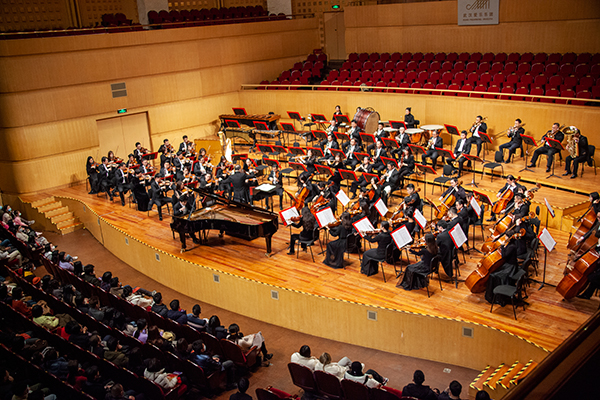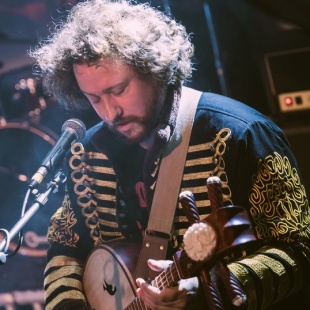Wuhan gets back on its musical feet


Classical return
In addition to the indie music scene's revival, classical music fans in Wuhan are returning to concert halls, with the city's main performing arts venues, Wuhan Qintai Concert Hall and Wuhan Qintai Grand Theater, reopening in July last year.
On Jan 15, the Wuhan Philharmonic Orchestra opened its new season with a concert under the baton of Chinese-Singaporean conductor James P. Liu, featuring the pianist Zhang Haochen. With works by Russian composers such as Sergey Rachmaninoff and Dmitri Shostakovich, the performance sold out days in advance.
Liu, who was appointed the orchestra's music director in 2004, said, "All the musicians felt very emotional when they returned to the concert hall and performed in front of audiences.
"Many of my friends, who are musicians living in the US and Europe, tell me they find it hard to believe that we can now have live concerts again in Wuhan.
"Musicians whose shows were canceled suffered a heavy blow and had to find other ways to make a living. The pandemic has changed many things, such as the way we enjoy music, the way in which we communicate and even the way we see the world."
Liu studied music at Utrecht Conservatorium in the Netherlands and Michigan State University in the US.
As its first formal music director and chief conductor, he took the Wuhan Philharmonic Orchestra professional, programming 80 concerts worldwide every year.
Because of the pandemic, the annual Wuhan International Piano Festival, which Liu founded in June 2011, was delayed to September last year.
At the event, Liu conducted the orchestra in a performance of Rebirth, a new work composed by Guan Xia. The performance was staged near Wuhan's landmark Yellow Crane Tower, which was built during the Three Kingdoms period (AD 220-280).
The work, a tribute to those who made significant contributions to the battle against the pandemic, was also staged at universities in November and December.
Li said: "It will become a collective memory for all of us who lived through the year 2020. Music is important to people. Gathering in one place and sharing the energy of music is a fantastic experience."
From October to December, Liu gave some 15 shows a month, most of which quickly sold out, which he said was solid evidence of the demand for live classical music concerts.
He added that he hopes to give young Chinese musicians as many opportunities as possible to perform this year.
"Young musicians, especially those who are students pursuing degrees from overseas conservatories, have had to take online courses, which is frustrating. We want to let them perform onstage, because this brings hope," Liu said.
However, with new cases of COVID-19 recently reported in areas of the country such as Hebei, plans to stage concerts may have to be changed to lower the risk of transmission.
- Tokyo Tower lit in red a beacon of hope amid pandemic
- Chinese, US musicians celebrate Lunar New Year with annual concert
- Virtual concert celebrates Year of Ox with fusion of Chinese, western music
- Global celebrations of Chinese Lunar New Year continue to delight despite being virtual
- Pianist Lang Lang releases new extended edition of 'Goldberg Variations'





































